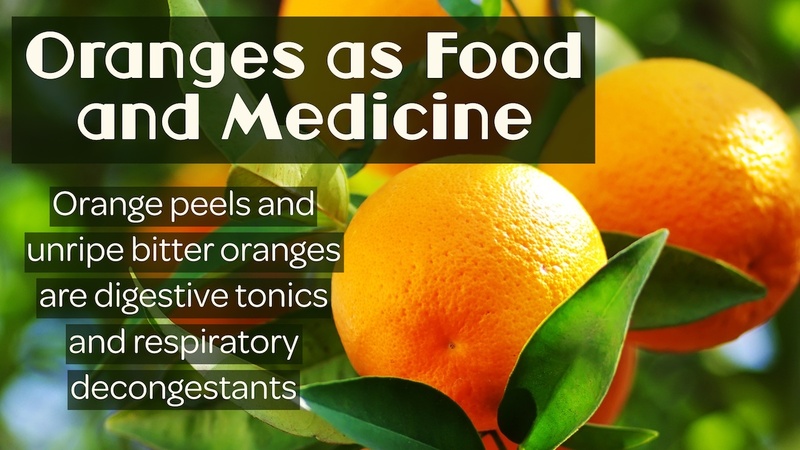
There was a time when sweet oranges were a special treat in most of North America. Children would get them in Christmas stockings. And while they still are a sweet, healthy treat, now, they are easily attainable and available year-round. Oranges also have medicinal benefits that vary by species and the part being used.
Oranges belong to the Citrus genus, which includes mandarins, tangerines, lemons, grapefruit, and limes, as well as lesser-known species such as pomelos, citrons, and kumquats. The focus of our article, however, will be two citrus hybrids, sweet orange (Citrus × aurantium) and bitter orange (Citrus × sinensis). Both appear to arise as hybrids between Citrus maxima (pomelo) and Citrus reticulata (mandarin or tangerine).
Orange Peel as a Medicine
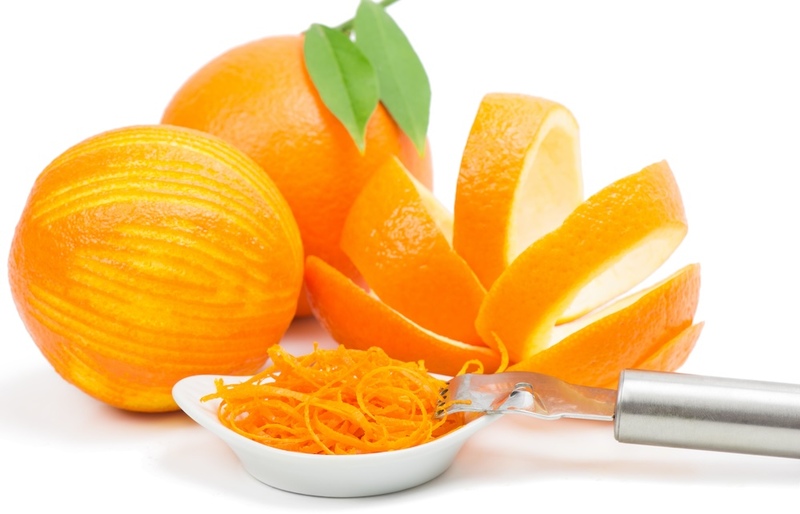 The primary medicinal part of the orange is the peels. Orange peel is aromatic and bitter. This blend of flavors makes it highly valuable as a digestive stimulant. Many digestive bitters formulas include orange peel, such as David Winston’s DOPA formula (Dandelion, Orange Peel, and Angelica). Orange peel stimulates digestive secretions, relieves gas and bloating, increases peristalsis, and improves overall digestive function. It can also stimulate the appetite of people who are weak or convalescing.
The primary medicinal part of the orange is the peels. Orange peel is aromatic and bitter. This blend of flavors makes it highly valuable as a digestive stimulant. Many digestive bitters formulas include orange peel, such as David Winston’s DOPA formula (Dandelion, Orange Peel, and Angelica). Orange peel stimulates digestive secretions, relieves gas and bloating, increases peristalsis, and improves overall digestive function. It can also stimulate the appetite of people who are weak or convalescing.
Limonene, a constituent in orange oil, has been shown to provide long-term relief of heartburn, due to its ability to promote peristalsis and neutralize gastric acid in the esophagus (heartburn). Orange peel also helps stimulate the gall bladder and may help to get rid of cholesterol-based gallstones and reduce gall bladder inflammation.
Orange Peel in TCM
The peels of sweet and bitter oranges, as well as tangerines, are used in traditional Chinese medicine (TCM) as a remedy for both digestion and respiratory problems. The flavor is said to be acrid, warm, and bitter. Orange peel is used to relieve stagnant energy in the stomach and spleen meridians. It helps to ease nausea, vomiting, sluggish peristalsis, and bloating. Besides stimulating digestive secretions and improving motility, orange peel has some immune activity that helps regulate the gut microflora.
Orange peel also acts as a decongestant and expectorant to eliminate mucus from the respiratory system. It can help with coughing and bronchitis and be used to add flavor to cough and cold remedies.
Bitter Orange in TCM
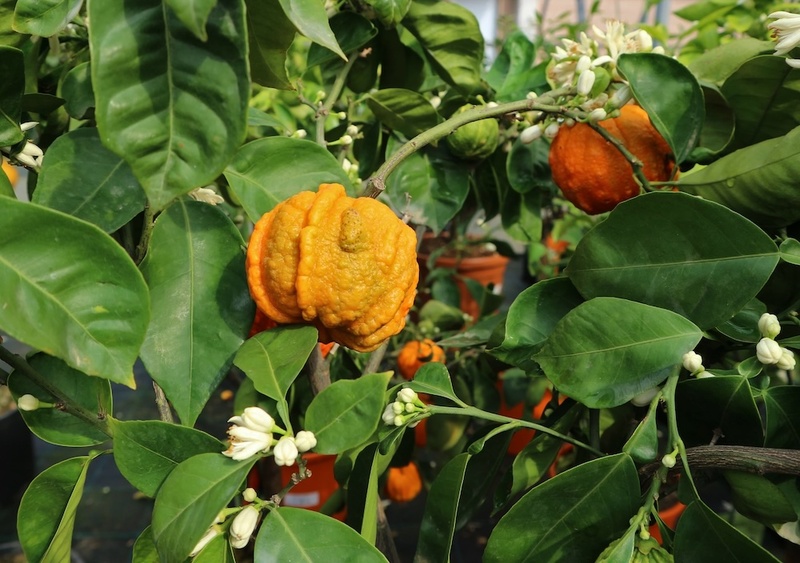 Besides the peelings, the immature, green bitter oranges (Citrus × sinensis) are also used in TCM. They are considered bitter, acrid, and cooling, rather than warming. They are also a digestive tonic, but appear to be more stimulating to intestinal peristalsis and better at relieving bloating, belching, and foul breath. They also relieve feelings of hardness and abdominal distension.
Besides the peelings, the immature, green bitter oranges (Citrus × sinensis) are also used in TCM. They are considered bitter, acrid, and cooling, rather than warming. They are also a digestive tonic, but appear to be more stimulating to intestinal peristalsis and better at relieving bloating, belching, and foul breath. They also relieve feelings of hardness and abdominal distension.
Symptoms that bitter orange may be a helpful remedy include loss of appetite, a bloated or heavy feeling in the abdomen, feeling like bowel movements are incomplete, foul-smelling stool, and acid regurgitation with a rotten, sour smell. Of course, in TCM, Immature bitter orange would typically be combined with other herbs depending on the exact nature of these symptoms.
Oranges and Tangerines for Respiratory Problems
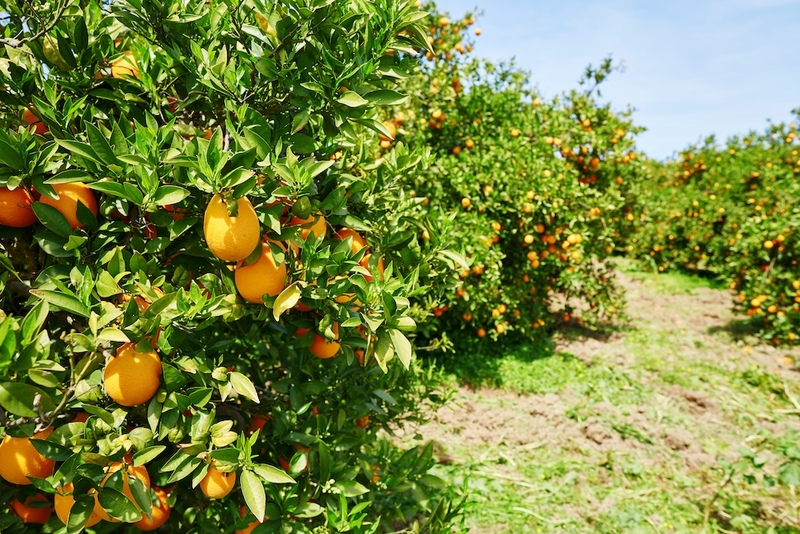 The mature peelings from oranges and tangerines are used as a respiratory remedy in TCM. The most effective part here seems to be the outer, orange part of the peeling, minus the white pith. We typically call this part the zest in cooking and obtain it by gently grating the peel. It is a decongestant, which loosens the phlegm, and a mild expectorant, helping to expel the mucus and ease coughing.
The mature peelings from oranges and tangerines are used as a respiratory remedy in TCM. The most effective part here seems to be the outer, orange part of the peeling, minus the white pith. We typically call this part the zest in cooking and obtain it by gently grating the peel. It is a decongestant, which loosens the phlegm, and a mild expectorant, helping to expel the mucus and ease coughing.
Bitter orange extracts became popular as ingredients in respiratory formulas in the West after ephedra was banned. Chinese ephedra contains ephedrine, an alkaloid that mimics epinephrine. It dilates the bronchial passages and acts as an antihistamine to dry up secretions. It was being widely misused as a stimulant to aid weight loss and was banned because of adverse reactions caused by harm from the excessive doses people were using. You can read more about this in my article Exploring Western Ephedra.
Because the alkaloid synephrine in bitter orange is also an epinephrine mimic, standardized extracts of bitter orange found their way into weight loss formulas and anti-allergy supplements. In both applications, synephrine is much weaker in action, so it has proved to be a poor substitute. Still bitter orange does have some benefits in respiratory formulas. It can help to ease congestion and feelings of constriction in the bronchial passages, coupled with shortness of breath and fatigue.
Other Benefits of Bitter Orange
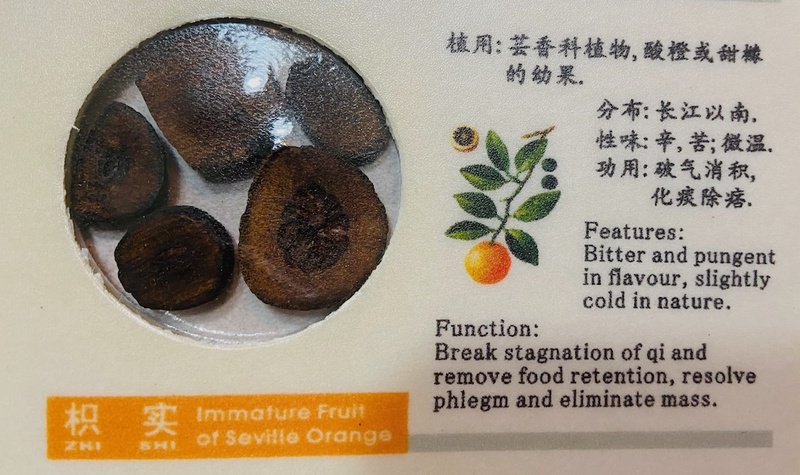 The TCM remedy Zhi Shi, known in the West as aurantium immaturus or immature bitter orange, has some other uses besides clearing digestive and respiratory congestion. It is used for treating chest pain or angina caused by heart yang deficiency (which we might call weakness of the heart energy) accompanied by mucus or phlegm accumulation. It has a mild stimulating effect on the heart and increases blood pressure while enhancing microcirculation in the heart, brain, and kidneys. It is also mildly diuretic.
The TCM remedy Zhi Shi, known in the West as aurantium immaturus or immature bitter orange, has some other uses besides clearing digestive and respiratory congestion. It is used for treating chest pain or angina caused by heart yang deficiency (which we might call weakness of the heart energy) accompanied by mucus or phlegm accumulation. It has a mild stimulating effect on the heart and increases blood pressure while enhancing microcirculation in the heart, brain, and kidneys. It is also mildly diuretic.
It is also used in TCM to ease distension and hardness in the abdomen caused by gallbladder inflammation (cholecystitis), something we commonly call a gall bladder attack. It is typically combined with other herbs, like bupleurum, for this purpose.
Orange Essential Oil
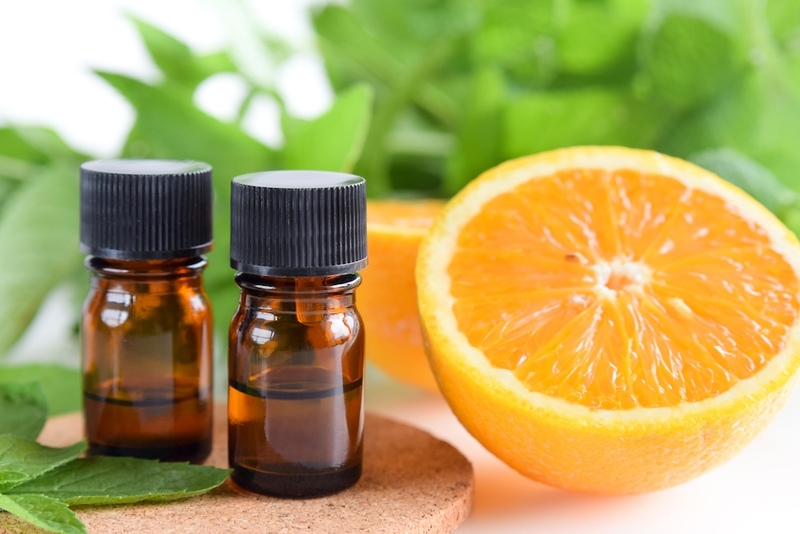 I would classify the essential oil of sweet oranges as fruity and sweet, and like the herb, it is helpful for settling digestive upset, easing cramps, gas, irritable bowel, and constipation. The fragrance is also mildly sedating and helps to ease anxiety and promote sleep. This parasympathetic action probably aids vagal nerve function and helps with the gut-brain axis to improve both digestion and mood. It’s especially helpful for children who are experiencing indigestion or insomnia due to stress.
I would classify the essential oil of sweet oranges as fruity and sweet, and like the herb, it is helpful for settling digestive upset, easing cramps, gas, irritable bowel, and constipation. The fragrance is also mildly sedating and helps to ease anxiety and promote sleep. This parasympathetic action probably aids vagal nerve function and helps with the gut-brain axis to improve both digestion and mood. It’s especially helpful for children who are experiencing indigestion or insomnia due to stress.
Sweet orange oil is antifungal and antibacterial. It stimulates lymph flow and can be helpful topically for soothing dry, irritated skin. It also helps promote lymphatic drainage to reduce swelling and remove cellulite.
Emotionally, it’s one of the oils I feel helps the pancreatic energy center, which allows us to express the fun side of our nature, what I like to call the playful inner child. This means it helps to promote happiness and laughter and is good for those who take themselves too seriously. It aids cheerfulness and optimism while easing fears and self-doubts. Children tend to love the fragrance, so it’s a good one to use when they are upset or stressed.
Oranges as Food
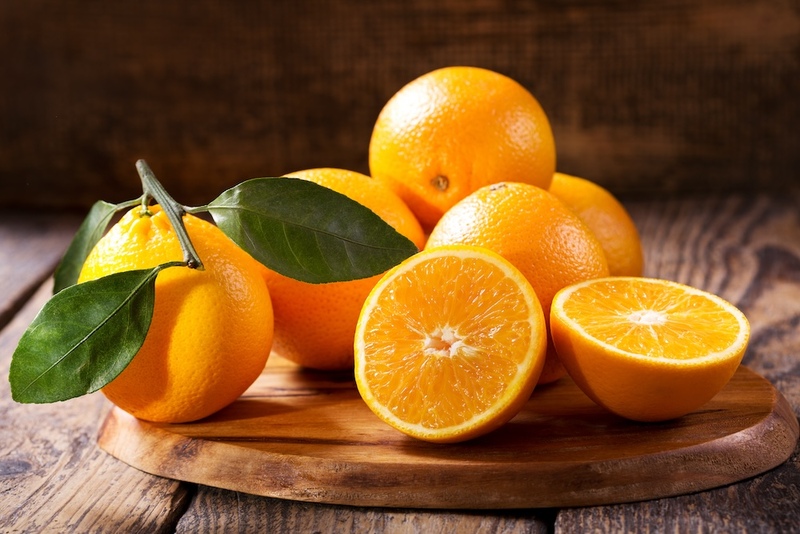 Let’s wrap this up with a discussion of the benefits of eating oranges. Citrus fruits are a good source of vitamin C, and one orange contains 100% of the recommended daily allowance (RDA) of vitamin C. The RDA is only 75 mg, which is way less than what you’ll get from a vitamin C supplement (which typically has 500 mg or more). But the orange is a whole food, not isolated ascorbic acid, and in my experience, eating whole foods is a better way to get nutrients than supplements. That’s why I’d buy a case of oranges in the winter months to give my children, rather than giving them vitamin C supplements.
Let’s wrap this up with a discussion of the benefits of eating oranges. Citrus fruits are a good source of vitamin C, and one orange contains 100% of the recommended daily allowance (RDA) of vitamin C. The RDA is only 75 mg, which is way less than what you’ll get from a vitamin C supplement (which typically has 500 mg or more). But the orange is a whole food, not isolated ascorbic acid, and in my experience, eating whole foods is a better way to get nutrients than supplements. That’s why I’d buy a case of oranges in the winter months to give my children, rather than giving them vitamin C supplements.
I would also recommend peeling and eating the actual orange, not drinking orange juice. You need the fiber in the orange to slow the release of the sugars into the bloodstream. It’s even better if you eat a little bit of that white pithy stuff from the peeling with your orange. That white stuff is loaded with flavonoids, which work synergistically with vitamin C, and also give you some of the medicinal benefits of orange at the same time.
Thoughts About Eating Oranges
I do want to make a couple of suggestions about eating oranges. First, oranges grow in warm climates. They are refrigerants or cooling remedies, which lower the body temperature. That’s great for reducing heat in warm weather or bringing down fever or inflammation, but not a good food to consume before going outside in cold, winter weather. This comes from my personal first-hand experience. If I need to go outside and shovel snow, I’m not going to eat an orange first.
Second, some people have negative reactions to oranges, particularly if they have GERD. However, I wonder how many of these reactions stem from most grocery store oranges being picked green and ripened off the tree. I’ve eaten tree-ripened oranges and they not only taste better, but I feel better after eating them. But this is just part of the general problem of eating foods that are picked, packaged, and shipped thousands of miles for our convenience.
Using Orange Peel and Orange Oil
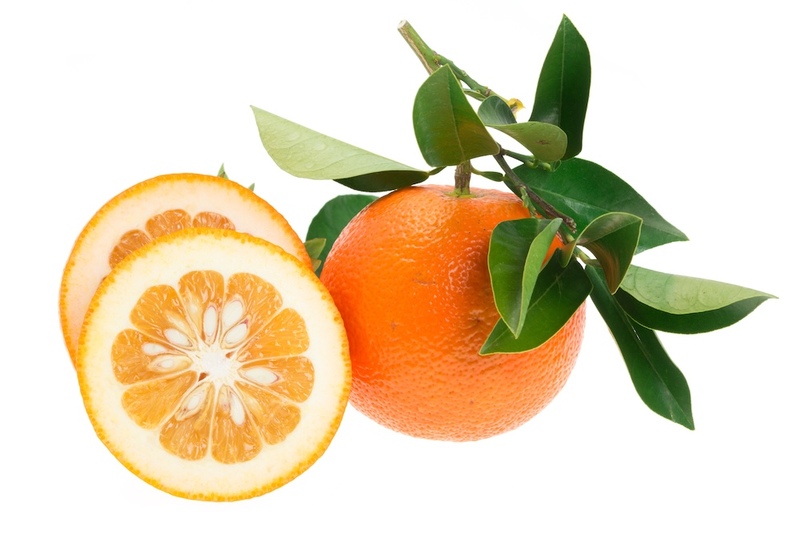 If you’re going to use orange peel as a medicine, make sure that you only use the peelings from tree-ripened organic oranges. You can extract orange peel in alcohol in a standard 1:5 tincture of brandy or other 40% (80 proof) alcohol and take 20 to 50 drops up to three times a day. You can also extract the peels using the sealed simmer glycerite method. You can also make a tea using one teaspoon of finely chopped or powdered peelings per cup of water.
If you’re going to use orange peel as a medicine, make sure that you only use the peelings from tree-ripened organic oranges. You can extract orange peel in alcohol in a standard 1:5 tincture of brandy or other 40% (80 proof) alcohol and take 20 to 50 drops up to three times a day. You can also extract the peels using the sealed simmer glycerite method. You can also make a tea using one teaspoon of finely chopped or powdered peelings per cup of water.
I think orange peel is one of those remedies best used as part of a formula, which is how it’s used in TCM. I would use it in formulas to aid digestion or in formulas to ease respiratory congestion.
You can also use the essential oil. It can be inhaled for its nervous and emotional calming properties. It can also be used topically, either neat or diluted, for reducing swelling, promoting lymphatic drainage, dissolving cellulite, or soothing rough or calloused skin.
Orange oil is one of the oils I consider safe for internal use, but it should be diluted for internal use. I’d use a 1:20 dilution for children and a 1:10 dilution for adults. This means you mix one drop of orange oil with 10-20 drops of a fixed oil like olive or coconut oil. I’d use only 1-2 drops of the oil internally twice daily and for a period of two weeks or less. You could also add it to yogurt or honey. You can also use the oil in a formula, such as a cough syrup or digestive bitters formula, for flavoring.
And, of course, you can also eat oranges for their nutritional value. They are especially good if you live in a climate where they grow naturally and can get them locally. Just remember to eat the whole orange or juice it with the pulp to avoid spiking blood sugar levels as well as eating a little of the pith.
Steven's Articles
-

-
The Uplifting Fragrance of Jasmine
Jasmine lifts depression, aids self-confidence,…
February
-

-
Reishi (Ganoderma) Mushroom
A TCM remedy for calming the shen (spirit), balancing…
-

-
Eucommia Bark
A superior tonic that promotes kidney, structural,…
January
-

-
Goldenthread, Phellodendron, and Yellow Root
Three herbal remedies containing the infection-fighting…
-

-
Teasel
A traditional herb for healing bones and joints…
-

-
Barberry and Healthy Personal Boundaries
A thorny shrub for fighting infections and supporting…
December
-

-
The Evidence for Berberine
A yellow alkaloid found in traditional infection-fighting…
-

-
The Sensible Use of Caffeinated Herbs
Kola nuts, guarana, and yerba mate and other herbs…
-

-
The Health Benefits and Problems with Coffee
This popular caffeinated beverage can be beneficial…
October
-

-
Understanding Caffeine & Cellular Adaptation
Preserving the power of caffeine's buzz and the…
September
-

-
Horseradish
A pungent spice for aiding protein metabolism…
-

-
Banaba or Crepe Myrtle
A beautiful tree from Southeast Asia whose leaves…
August
-

-
Monkeyflowers
Flower essences to help see ourselves more clearly…
-

-
Mariposa Lilies
Strengthening the bond between mother and child…
-

-
The Noble Bay Leaf
A common kitchen herb for aiding digestion and…

